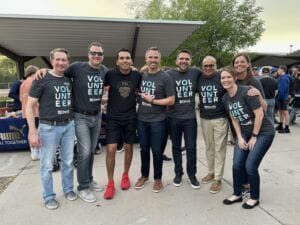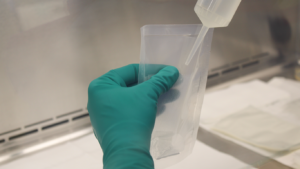Arizona State University announced that it has established the McCain Institute for International Leadership.
The new Institute is initially supported by a $9 million gift from the McCain Institute Foundation, a charitable trust funded by Arizona Senator John McCain. Arizona State University will build the nonpartisan and nonprofit education and research center, based in Washington, D.C., and with a physical presence in Tempe. Full establishment of the McCain Institute is planned for early 2013.
Already deep in the planning stages, the McCain Institute for International Leadership will focus on promoting character-driven leadership, as well as research and decision-making in the areas of humanitarian work, human rights and national security. It also will seek to promote rigorous debate, in the best American tradition of open inquiry, spirited discussion and practical action.
The myriad challenges and opportunities facing America and the world – including humanitarian crises and economic competition; democratic uprisings in the Middle East and cartel-driven violence and drug-trade along the U.S.-Mexico border; a rising China and global competition for resources – all demonstrate the continuing need for character-driven leadership, and rigorous analysis and decision-making. Through its policy research, events, fellows programs and other activities, the Institute aims to inform, convene and assist policymakers, and to train future leaders from the United States and abroad.
“The charge of the McCain Institute for International Leadership fits in perfectly with Arizona State University’s core mission of having a significant positive impact on the larger community, and we are grateful to Senator McCain for his support of this important university endeavor,” ASU President Michael Crow said. “It will be guided by the values that have animated the career of Senator McCain – a commitment to sustaining America’s global leadership role, promoting freedom, democracy and human rights, as well as maintaining a strong, smart national defense.”
As a university that has pioneered a new model for an American research university, Arizona State brings substantial capacities to the table unmatched by traditional Washington think tanks. The university’s renowned faculty, its numerous schools and centers, and its unique “Decision Theater” capability offer a scholarly resource base that can help develop recommendations for improved decision-making.
The McCain Institute’s Washington location also offers new opportunities for ASU, including possibilities for student internships, research fellowships, and eventually a “Washington Semester” for ASU students. The Institute will contribute to Arizona State University’s critical thinking and research missions by expanding its profile and access to policy-making in Washington, D.C.
Former U.S. Ambassador to NATO Kurt Volker has been named Executive Director of the Institute. Until recently, Volker served as a senior follow and managing director of the Center on Transatlantic Relations at John Hopkins University’s School of Advanced International Studies (SAIS). He also serves as a senior advisor at the Atlantic Council of the United States and is a member of its Strategic Advisory Group.
“The McCain Institute has a real opportunity to fill some gaps in Washington – first, by building future international leadership through a Fellows program, and second, by engaging directly with senior decision-makers in developing, analyzing, testing, and promoting the implementation of innovative policies,” said Volker.
Senator Mark Udall (D-Colo.) said he is “pleased that Senator McCain and Arizona State University are joining forces to create the McCain Institute…” “When I first came to the Senate in 2009, John befriended me, just as my father had befriended him years ago. We have worked together in the same nonpartisan approach that the McCain Institute will bring to international affairs – one based on shared values and common interests, not ideology.”
“Washington is not a town short of ideas, it is a town short of leadership,” said Senator Lindsey Graham (R-S.C.). “Policy proposals without leadership and values behind them, or people who are courageous enough to fight for them, will not stand up to the international challenges we face. I believe that the McCain Institute will be a center of gravity, a meeting place where we can robustly debate the great issues of our time and come away with a sense of purpose and a passion for character-driven leadership.”
At this stage, the Institute is focusing on three early tasks: (a) creating institutional capacity, including physical space, personnel, partnerships, and linkages to ASU’s existing faculty and resources; (b) launching initial work to design the Fellows program and to engage with policymakers and partners to strengthen policies against trafficking in persons; and (c) reaching out to develop a long-term network of supporters and contributors.
The Institute’s “Cornerstone Meeting,” held April 27-29, 2012, in Sedona, Ariz., brought together leading policymakers such as CIA Director David Petraeus and Senators Lindsey Graham (R-S.C.), Sheldon Whitehouse (D-R.I.), Kelly Ayotte (R-N.H.) and Jon Kyl (R-Ariz.) to discuss the central issues facing our world. The Cornerstone Meeting helped to sharpen the McCain Institute’s vision as a unique institution in Washington and to build lasting commitment from a wide community of supporters.
As explained in the Institute’s mission statement, four central objectives guide the institute’s work:
- Provide decision recommendations for leaders through open debate and rigorous analysis, by convening experts, publishing policy-relevant research, and holding decision-making training events using cutting-edge technology. This includes convening policymakers, academics, journalists and other experts to discuss and debate important national security issues, as well as hosting exercises, war games and “red team” exercises centered on key national security issues that will likely emerge on the mid-term horizon. ASU’s innovative Decision Theater will be one of the venues utilized.
- Identify and train new national security leaders, both American and foreign, in public service and private enterprise, as well as military spheres. This includes establishing an internship program for undergraduate and graduate students, a McCain Leadership Fellows Program, and a class of Next Generation McCain Fellows composed of rising national security professionals.
- Play a unique role in a crowded intellectual space by serving as Washington’s preeminent “decision tank.” This includes sponsoring the Sedona Forum, an international gathering of top government officials, private sector leaders and issues experts in Sedona, Arizona, focused on the nation’s and the world’s most pressing issues, as well as the McCain Debates, a speaking series in Washington that provides an arena for experts and policy makers to debate key issues.
- Promote and preserve the McCain family spirit of character-driven leadership and national service, including hosting the McCain family archives. This includes partnering with foreign and domestic organizations to convene discussion on issues of regional and global importance, as well as hosting an electronic document repository to serve as a center of research and information for historians, academics, students and others.




